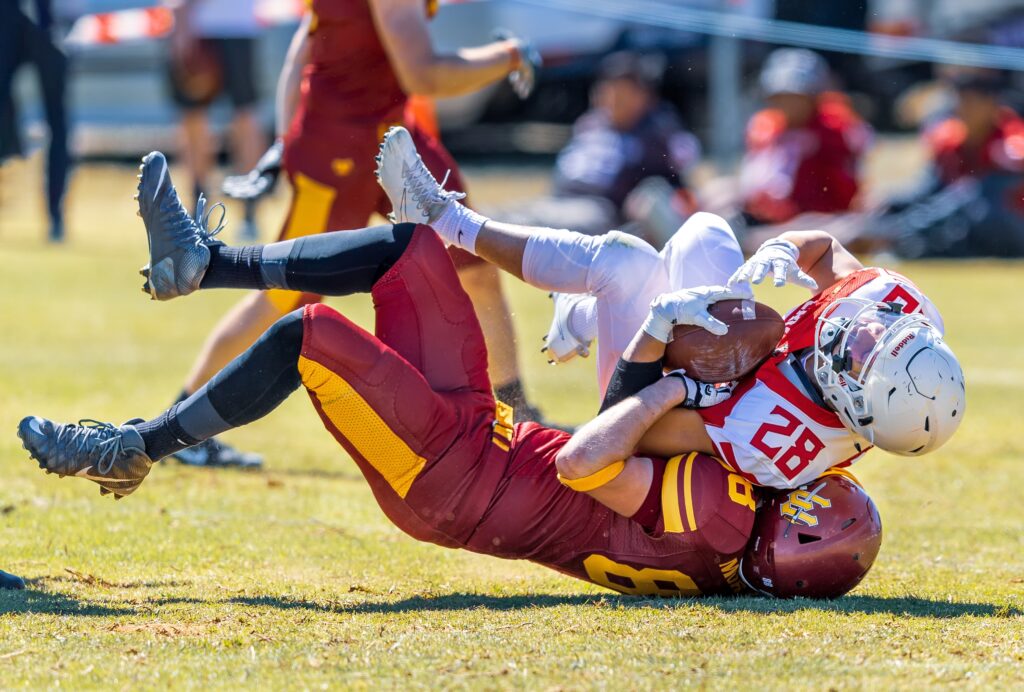In 2019, opiate abuse was responsible for about 50,000 overdose fatalities in the US. Further, a separate study determined that opiate abuse is a rampant practice in athletics and other contact sports.
Read on to learn about opiate abuse in athletics and available treatment and therapy options available in Corona, California.
What are Opiates?
Opiates are a class of opioid drugs that can be very addictive and lead to serious health problems. There are different types of opiates, but they all work in similar ways.
Opiates typically alter the nervous system in the body by binding to opioid receptors. These receptors are responsible for a wide variety of issues relating to the perception of the five senses. The body has a set of natural opioids called endogenous opioids. These chemicals help regulate how the body perceives senses such as pain and response to stimuli.
Under certain circumstances causing extreme stimuli, endogenous opioids aren’t enough to suppress pain to a comfortable level. This inbuilt survival mechanism elicits sufficient immune response or entices individuals to avoid or remove harmful stimuli.
Consequently, exogenous opioids were first developed to help with pain management by Friedrich Serturner in 1803. Morphine was the first case of exogenous opioids used for analgesic purposes.
The Difference Between Opiates and Opioids
Although both terms are regularly used interchangeably, there is a difference between the two. Opiates are drugs that are derived from naturally occurring substances. However, opioids are synthesized in a laboratory, and they can be semi or fully synthetic.
It’s also worth noting that opioid is an umbrella term used to refer to both opiates and opioids.
Why Opiates Are Often Abused In Sports
While opiates and opioids can be used for legitimate medical purposes, they also have a high potential for abuse and addiction. There are three main reasons why athletes may turn to opiate abuse.
Pain Management
Contact sports are responsible for roughly more than 3.5 million injuries. And opiate derivatives are the most prescribed pain relief medication issued to injured athletes. Despite opiates being highly effective analgesics, sustained use for pain relief renders endogenous opioids ineffective in natural body pain management.
As a result, individuals who abuse opiates as analgesics won’t be able to naturally manage pain. Because of this, dependency will occur leading to eventual addiction to the drugs.
Ability Enhancement
Just like everyone, athletes experience some form of performance anxiety. To ensure performance, some of them may turn to opiates to keep them going while injured.
Euphoria and High Effect
Aside from the analgesic effect, opiates also trigger dopamine release in the body. When dopamine is released in large amounts, users experience extreme euphoria and a bit of high.
Given the dangers of addiction and other health risks, athletes need to know the dangers of opiate abuse. It is essential to seek help when displaying signs of addiction.
Symptoms of Opiate Tolerance
Tolerance occurs when the body is introduced to too much exogenous opiates making endogenous opiates ineffective in the body. Gradually the body begins to require more amounts of the drug to achieve the desired effect. Tolerance is a normal physiological response, but it can also signify problematic drug use. It can manifest in the form of:
- Frequent opiate use
- Using increased dosage
- Difficulty quitting
Effects of Opiate Abuse
In the short term, opiate abuse can lead to impaired judgment and coordination, slowed reaction times, and decreased motor skills. This can put athletes at a serious disadvantage when competing against others who are not under the influence of drugs. In addition, opiate abuse can also lead to increased levels of anxiety and paranoia.
The long-term effects of opiate abuse can be even more dangerous. These effects can include addiction, organ damage, and death. Athletes who abuse opiates are at a higher risk for developing addictions than those who do not use opiates. Addiction has the ability to further ruin their lives and careers when left untreated.
Opiate Abuse Treatment
There are two main effective treatment options available for athletes who are struggling with opiate abuse, such as:
Detoxification
Usually, it’s the first treatment approach, and it can be done in two ways.
- Cold turkey – complete and instantaneous detox
- Tapering – drug dosage is reduced gradually
In severe cases of dependence on opiates, the tapering approach may be appropriate to offset possible withdrawal effects.
Medication-Assisted Treatment (MAT)
Involves medical intervention with therapy to treat addiction.
Medication involved in MAT primarily induces specific responses that mimic opiates but without the adverse effects. Other drugs also block the effects of opiates on the brain and nervous system.
The effects of opiate abuse manifest differently in each individual depending on the level of abuse, age, gender, etc. Even after completing treatment, some patients resume opiate abuse. In effect, various therapy programs have been developed to cater to different needs and guarantee a complete recovery from addiction.
Personalized Attention Addiction Therapy
As the name suggests, this program is customized to specific individual needs. The patient and a qualified therapist work together to identify and eliminate the causes of the addiction.
Group Therapy
It involves a therapist working with a group of individuals with similar addiction problems.
Cognitive Behavioral Therapy
This program focuses on identifying underlying factors prompting opiate use. Our team of professionals teach patients how to replace negative thought patterns that support drug dependency with constructive ones.
What to consider when seeking opiate abuse treatment
When it comes to seeking treatment for opiate abuse, there are a few things to consider. First, it is crucial to find a treatment facility specializing in treating addiction. Addiction is a complicated matter that requires specialized care.
Additionally, it is essential to ensure that the treatment facility you choose offers evidence-based care. This means that their treatment methods are proven as effective in treating addiction.
Finally, you should make sure that the treatment facility you choose offers a variety of services. These services include detoxification, individual counseling, group therapy, and aftercare planning.
Contact Shahida’s Place today to schedule an appointment, and start your journey to recovery.







